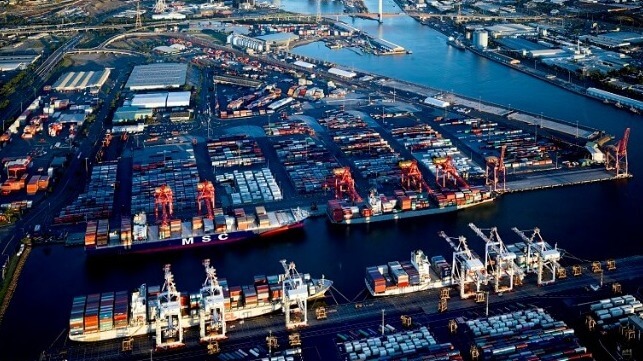Australia Calls for Labor Law Changes to Address Port Inefficiencies

The Productivity Commission of Australia released a report, which among other issues focuses on boosting productivity at the country’s major seaports. The report contends that persistent inefficiencies at the Australian ports are costing the economy an estimated A$605 million (approximately US$415 million) per year.
The report is part of an inquiry commissioned by the Coalition Party during the tenure of Scott Morrison, leader of Australia’s Liberal Party and the country’s Prime Minister from 2018 till May of this year. Last December, former Australian Treasury head Josh Frydenberg, tasked the Productivity Commission to examine the efficiency of Australia’s ports.
At the time, they cited the impetus of the report based on a long-running dispute between the Maritime Union of Australia (MUA) and some port terminal operators. In August, ten ports across Australia were yet again disrupted after workers boycotted work to negotiate for a better enterprise agreement (EA). The inquiry was also extended to review workforce issues and industrial relations in Australia’s maritime sector.
Part of the verdict the inquiry returned is for an overhaul of workplace laws at the Australian ports, wresting power from the Maritime Union of Australia which the authors contend is necessary to salvage the shipping industry.
The report argues that businesses should be given the ability to fight back against threatened strikes in a push to limit MUA’s unchecked dominance. This includes making it easier for the Fair Work Commission (FWC) to stop port workers’ industrial action, and the creation of an environment where importers and exporters can easily intervene.
“Systemic industrial relations issues across the entire container freight supply chain have played a pivotal role in inhibiting productivity and efficiency gains at Australian ports. While this has been a challenging area for some time, restrictive work practices and industrial actions have escalated in recent years,” reports the Australian Competition and Consumer Commission (ACCC).
The report says that conditions in container terminal operations have conferred significant, and unbalanced, bargaining power on employees. The dominance of MUA and its high membership density within the ports’ workforce has further strengthened that position.
“The risk of conflict also has a historical dimension, with long-standing adversarial relationships between employers and employees,” notes the report.
Consequently, the average EA negotiations time has increased in the recent past, with a substantial impact on container terminal operations.
As a response, Productivity Commission is recommending a series of measures, which includes amending the Australian Fair Work Act to allow the Fair Work Commission to suspend or terminate protected industrial action when it is causing, or threatening to cause, significant economic harm to one party under the EA rather than both (as it is currently the case).
Other amendments include a mandatory requirement for FWC intervention when certain thresholds in bargaining activity are reached, for instance, time limits or thresholds linked to the number or scale of protected industrial actions. Employers should also be given enough time to prepare for industrial actions by extending the mandatory three-day notice period for protected industrial action to up to seven days.

that matters most
Get the latest maritime news delivered to your inbox daily.
Earlier this year during a campaign trail, Labour Party leader Anthony Albanese and now current Australia’s Prime Minister, had promised to create a strategic “National Shipping Fleet” to shield Australia from supply chain disruptions.
The report however cautions that Australian-flagged vessels are not a prerequisite at this time as the international capacity they say appears to be working well. However, attention should be focused on addressing the lack of competition among terminal operators, leaving shippers without a choice and exposed to exorbitant charges.
